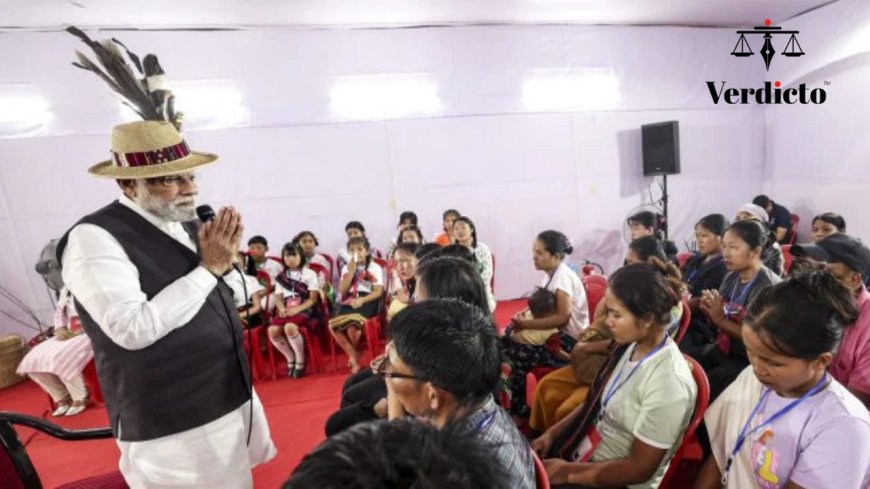Manipur’s Territorial Integrity Debate Returns as Modi Visits Conflict Zone
PM Modi’s first visit to Manipur since the 2023 ethnic clashes revives the unresolved debate over territorial integrity, autonomy demands of the Kuki-Zo, and the constitutional tensions shaping the state’s fragile peace.

Prime Minister Narendra Modi’s first visit to Manipur since the outbreak of ethnic clashes in 2023 has revived an old but unresolved debate — the question of Manipur’s territorial integrity.
While Modi’s outreach in Churachandpur comes with promises of development worth ₹7,300 crore, communities on the ground remain divided over whether reconciliation is possible without addressing the demand for autonomy and the contradictions embedded in the legal framework.
When asked for their reaction on development package announced by PM Modi, various eminent Kuki Zo people lamented that out of 7,300 crores worth development projects, only a paltry 23 crore has been allocated to KukiZo areas. They said they feel it's an intentional insult to the KukiZo as they are not seen as worth basic development, Vishvajeet Singh, Lawyer and Legal Advisor to the Kuki Organisation for Human Rights told Verdicto.
In Churachandpur, also known as Lamka to the Kuki-Zo people, the Prime Minister was greeted with both warmth and scepticism.
The Kuki-Zo Council (KZC) welcomed his visit as a “historic and rare occasion,” noting that no Prime Minister had set foot in the district in nearly four decades. But alongside their welcome, they renewed the demand for a separate administration under Article 239A of the Constitution, citing survival, security, and dignity as essential needs.
Others, however, were less hopeful. For those cut off from the rest of Manipur for nearly three years, Modi’s visit came too late. Earlier this week, protesters carried symbolic coffins outside the Deputy Commissioner’s office — a stark reminder of lives lost and trust broken.
The ongoing unrest stems from the 3 May 2023 High Court order directing the Manipur government to consider recommending the inclusion of Meiteis in the Scheduled Tribes list.
This ruling was perceived by the Kuki-Zo tribes as an existential threat. If implemented, it would have allowed the land-rich Meiteis to purchase property in the hills — something prohibited under current law — thereby deepening fears of dispossession.
The fallout was immediate:
- Over 6,000 Meiteis fled Churachandpur.
- Kukis, mainly students and employees, left Imphal Valley for the hills.
- NH2, the critical Imphal–Churachandpur lifeline, turned into a battleground marked by burnt houses and armed patrols.
Though NH2 has since reopened, the scars of displacement and violence remain.
Beyond the violence, the Kuki-Zo grievance is rooted in decades of neglect. Churachandpur, often described as the “best town in the hill districts,” has long lacked adequate development. The 2023 clashes compounded this sense of abandonment, pushing the community to assert its identity by renaming the town Lamka — a symbol of both pride and separation.
The Legal Knot: Territorial Integrity vs. Autonomy
At the heart of Manipur’s unrest lies a deeper constitutional puzzle.
A recent Press Information Bureau (PIB) release on the Suspension of Operations (SoO) agreement reiterated the clause on “territorial integrity of Manipur.” However, it omitted an earlier reference to a “time-bound negotiated settlement.”
This omission raised concerns among analysts. Dr. Kham Khan Suan Hausing, political scientist and former head of Political Science at the University of Hyderabad, calls it a contradiction:
“On one side, SoO groups are bound to uphold the territorial integrity of Manipur. On the other, the Centre promises negotiations. Article 3 of the Constitution gives Parliament unilateral power to alter state boundaries. India’s external borders are sacrosanct, but state boundaries remain flexible. That tension fuels today’s demands.”
For the Kuki-Zo community, this legal opening under Article 3 sustains hopes of eventual separation. For the Meiteis, however, “territorial integrity” is non-negotiable.
During his address, PM Modi appealed to all communities to embrace peace:
“I appeal to all organisations to walk the path of peace, realise your dreams, and secure your children’s future. I assure you — I am with you, the Government of India is with you, and the people of Manipur are united.”
Yet on the ground, the state remains fractured — socially, politically, and legally. Development announcements alone may not resolve the deeper fault lines of identity, land, and autonomy.
Two years since violence first erupted, Manipur is still in search of trust. The revival of the territorial integrity debate underscores how fragile the peace remains.
For Modi’s visit to become more than a symbolic gesture, it must grapple with the legal contradictions of Article 3, the aspirations of the Kuki-Zo people, and the insecurities of the Meiteis. Until then, Manipur’s wounds risk staying open — even as the nation watches for signs of healing.







